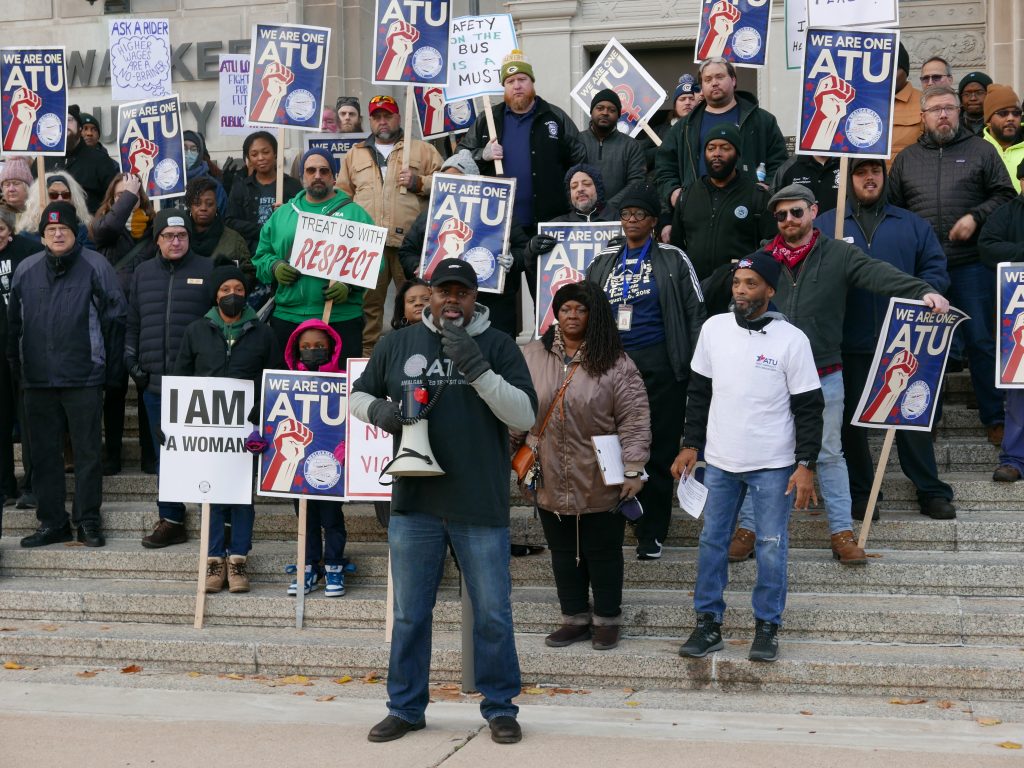Transit Union Rallies for Fair Contract
Union has authorized a strike while declining "final" offer from MCTS.

ATU President Donnell Shorter speaking outside Milwaukee County Courthouse. Photo by Graham Kilmer.
The union representing Milwaukee County Transit System (MCTS) bus operators and mechanics for the transit system held a rally outside the courthouse Wednesday demanding a better contract offer.
In October, members of the Amalgamated Transit Union Local 998 (ATU) voted to reject a final contract offer from MCTS and also voted to give union leaders the authority to call a strike. The union has been negotiating a new three-year contract with MCTS since April.
“We want to draw a line in the sand and bring transit back to what it used to be,” said Donnell Shorter, president of ATU Local 998. “This is their opportunity to do that.
The last time ATU bargained a contract negotiations went on for nearly two years and, shortly before a contract was agreed to, the union authorized a strike. The transit union last went on strike during contract negotiations in 2015, the first strike since 1978. As transportation workers, ATU is exempt from restrictions on collective bargaining passed as part of the 2011 Act 10 legislation.
Negotiations continue, and Shorter told Urban Milwaukee the union has meetings set up with the transit system for later this month.
MCTS has been struggling with declining ridership — and farebox revenues — for years. But the problem was greatly worsened by the arrival of the COVID-19 pandemic, and the system has yet to see ridership return to pre-pandemic levels. It has been using federal pandemic stimulus funding to plug holes in its budget, only to see state aid cut and now faces a projected $20 million budget deficit by 2025.
“These buses are still moving,” said ATU Vice President Michael Brown. “I’m trying to stop the strike. So this is my message to you, please give us a fair contract.”
Since authorizing the strike, union members and leaders have pointed to transit workers’ effots throughout the COVID-19 pandemic to keep the system running. “We took care of you,” Brown said. “Now we need you to take care of us.”
All this is contributing to an unsustainable rate of attrition for the transit system, which has hired and trained hundreds of new operators in recent years but has been unable to bring its staffing level up to the number needed to run the system as operators quit just as fast as new ones are hired. This has led to several routes and bus services being canceled for lack of drivers.
Shorter said the transit system continues to offer a signing bonus for new operators in this latest contract, but said, “There has to be something behind it to keep them.”
The union president noted that it’s expensive to train new operators. “They’re spending the money, it’s just where they’re spending the money.”
If you think stories like this are important, become a member of Urban Milwaukee and help support real, independent journalism. Plus you get some cool added benefits.
Political Contributions Tracker
Displaying political contributions between people mentioned in this story. Learn more.
- June 30, 2019 - Peter Burgelis received $100 from Ryan Clancy
MKE County
-
Prosecution Rests Case in Dugan Trial
 Dec 17th, 2025 by Graham Kilmer
Dec 17th, 2025 by Graham Kilmer
-
Chief Judge Questioned About ICE Policy, Texts, Emails in Dugan Trial
 Dec 17th, 2025 by Graham Kilmer
Dec 17th, 2025 by Graham Kilmer
-
Fellow Judge Testifies in Dugan Case
 Dec 16th, 2025 by Graham Kilmer
Dec 16th, 2025 by Graham Kilmer
Transportation
-
Congestion Pricing Cuts Air Pollution in New York City
 Dec 14th, 2025 by Jeff Wood
Dec 14th, 2025 by Jeff Wood
-
FTA Tells Milwaukee to Crack Down on Fare Evasion — Even Where Fares Don’t Exist
 Dec 12th, 2025 by Graham Kilmer
Dec 12th, 2025 by Graham Kilmer
-
Will GOGO’s Bus Service Ever Get Going?
 Dec 9th, 2025 by Jeramey Jannene
Dec 9th, 2025 by Jeramey Jannene




















